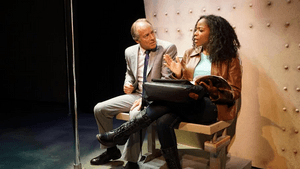Stay in the Loop
BSR publishes on a weekly schedule, with an email newsletter every Wednesday and Thursday morning. There’s no paywall, and subscribing is always free.
Public transportation meets private pain
Passage Theatre's 'White Guy on the Bus,' by Bruce Graham

Local playwright Bruce Graham's season of near-constant area productions continues with the East Coast premiere of White Guy on the Bus, at Trenton's Passage Theatre Company, a worthy companion to the Barrymore-winning Any Given Monday and North of the Boulevard, in that all three explore intriguingly thorny yet plausible moral dilemmas.
Ray, a successful financier played by Greg Wood, considers quitting his job. Wife Roz (Susan Riley Stevens) is a North Philly public high school teacher, but Ray’s income allows them to live comfortably in the suburbs. The neighbor’s son, Christopher (Nate Washburn) and fiancé Molly (Laura Chaneski), hip city dwellers, join Roz and Ray for dinners and drinks, sharing thoughts about the city versus the 'burbs, especially regarding safety and schools.
Issues of Race
Race comes up early and often in the couples' conversations: Chris is working on his sociology dissertation, exploring African-American images in advertising, the profession’s rules about minority portrayal, and how whites talk about blacks. Roz complains about inner-city teaching: the poverty, the violence, the prejudice she perceives from her black principal, which Molly contrasts with her relatively idyllic Bryn Mawr private school experience. “Your kids cut themselves,” Roz quips bitterly, “mine cut each other.”
Ray slips out of these scenes into almost dream-like interludes in which he rides a bus with young nursing student and single mom Shatique (Danielle Leneé), in fluid transitions staged by director Michelle Tattenbaum, made effortless by Jeffrey VanVelsor’s flexible abstract scenic design. Their conversations are believably tentative, then an unlikely friendship develops — but, of course, there's more to it. Why Ray deserts his Mercedes for SEPTA is a surprise, especially since the play’s action is not as linear as we first assume.
Ray, Roz, Molly, and Chris are white, which goes without saying -- I didn't have to mention it because in our culture, and in theater, that's what “normal Americans” are, right? Shatique, of course, is black. Graham and the cast make each character's point of view vivid and believable.
The Plot Delivers
White Guy on the Bus obviously concerns race, but so much more: economics, high school, academia, advertising, city life and suburban society, and the joys and perils of love. However, the play is not an issue-driven debate; instead, this is a powerful story about characters struggling with titanic decisions and negotiating desperately to save themselves. As in his other plays, Graham has a delicious way of penning realistic-sounding talk that seems to meander, but actually articulates important themes and ideas entertainingly and without preachiness. When key plot points (which I shall not divulge) are revealed, every cynical retort, frustration-fueled rant, and defensive comeback relates to the story's twists and turns.
White people talking frankly (and with little political correctness) about race may shock some people, as might Shatique's brutally honest insights about being black in America: "I could be president of Harvard Medical School, but if I walked down your street at four in the afternoon everybody'd think I just cleaned your house." But the real strength of White Guy on the Bus is how it's not about the talk but about the action, by which I mean the characters' real life-and-death choices.
What, When, Where
White Guy on the Bus by Bruce Graham, directed by Michelle Tattenbaum. Through May 22, Passage Theatre at the Mill Hill Playhouse, 205 East Front Street, Trenton, NJ. (609) 392-0766 or passagetheatre.org.
Sign up for our newsletter
All of the week's new articles, all in one place. Sign up for the free weekly BSR newsletters, and don't miss a conversation.

 Mark Cofta
Mark Cofta